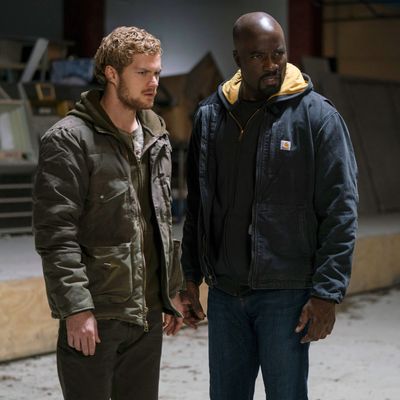
Spoilers ahead for Netflix’s The Defenders.
The political reception of Marvel’s Netflix output has been a mixed bag, to say the least. On one hand, it’s been hailed for its frank discussions of rape and PTSD in Jessica Jones, its addressing of race in Luke Cage, and its disabled lead in Daredevil. On the other, the most recent installment in the Marvel Netflix canon, this spring’s Iron Fist, came under heavy fire for its depiction of a rich white lead who travels to Asia and becomes a chosen-one master of martial arts. The white-savior dynamic led to uproar on social media and subsequent gloating when the show received poor reviews from critics.
How interesting it is, then, that Iron Fist protagonist Danny Rand (Finn Jones) has his privilege checked in this weekend’s team-up series, The Defenders. About halfway through the excellent third episode, he finds himself having a tête-à-tête with co-lead Luke Cage (Mike Colter), a working-class black man, shortly after the two meet for the first time. As fans of Marvel Comics well know, Luke and Danny have long been a duo, often appearing in their own title, Power Man and Iron Fist, where race and class have often been interrogated. In this scene, that tradition is carried on.
During their first meeting, Danny fought a black kid who was indirectly working for the sinister global syndicate known as the Hand. As the Hand’s sworn enemy, Danny attacked him viciously — something Luke has a big problem with. “You were gonna beat that kid within an inch of his life,” Luke says.
Danny scoffs lightly and replies, “Come on, I wasn’t gonna kill him.” Luke says it sure looked like he was, and that the kid had no idea who he was really working for and had only taken the Hand gig because he was desperate for work.
Danny accuses Luke of hypocrisy, saying Luke has probably fought people to save others, and rhetorically asks what the difference is between that and what Danny did. “The difference is, I live on their block!” Luke replies. “The difference is I’m not some billionaire white boy who takes justice into his own hands and slams a black kid against the wall because of his personal vendetta.”
Danny gets defensive and says the money doesn’t define him; Luke says it doesn’t matter, because the boy is in a jail cell and Danny isn’t. Danny says Luke doesn’t know anything about him. “I know enough,” Luke responds. “And I know privilege when I see it. You may think you earned your strength, but you had power before the day you were born.” The scene, though brief, is searing. Whatever you think of the conclusions it comes to, it’s hard to deny that it’s a remarkably direct call-out for a TV show about superheroes. According to co-showrunner Marco Ramirez, that was the whole point.
“I think with any one of these characters it’s really easy to just think about their superpowers first, and when they meet, what does it mean when their superpowers clash,” Ramirez tells Vulture. He wanted to avoid that simplicity. “Anybody can watch and make action figures just mash up against each other and have a good fight, but actually having a good, emotionally satisfying fight was even more important.”
That said, Ramirez says he and the rest of the show’s writing staff weren’t out to make a big political statement after the backlash to Iron Fist. “It wasn’t like we were purposely trying to write a scene about race, or anything like that,” he says. “We just thought, Oh, these two are not going to get along with this thing. We were going to give them scenes where they go up against each other, and the best way to do that is to make them have actual ideological arguments.”
Jones shares Ramirez’s assessment that the scene is more about two characters than it is about being a mouthpiece for behind-the-scenes political stances. “Usually, Danny will just see a problem and be Scrappy-Doo, will run at it with his fist and punch the hell out of it,” Jones tells Vulture. “Whereas, actually, what Luke is saying in that scene is, ‘Look, you’re a man of power. You’ve got a good heart. Think about this responsibly. Don’t just go with things with reckless intention. Actually take a step back and think about this stuff.’ And Danny, obviously, it’s the first time he’s heard that, and he responds to it.”
Colter came the closest to directly addressing the politics of the situation. “People have a lot of influence and money and they are just out of touch,” he says. “This is the problem with society — people get money and they feel that way. And what happens is they forget what it’s like to live the real life, you know?”

